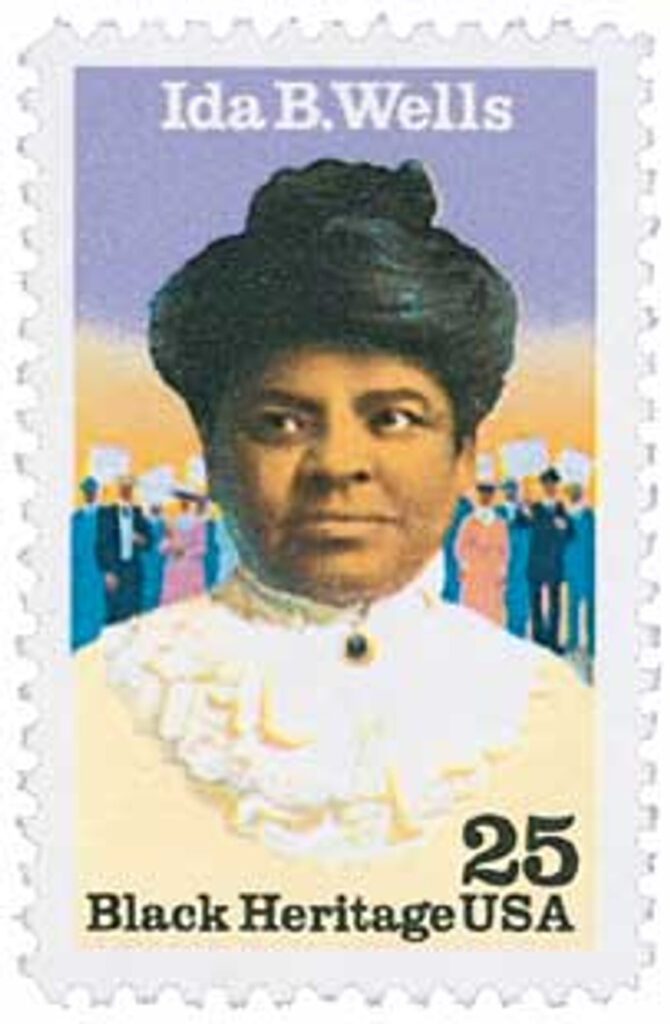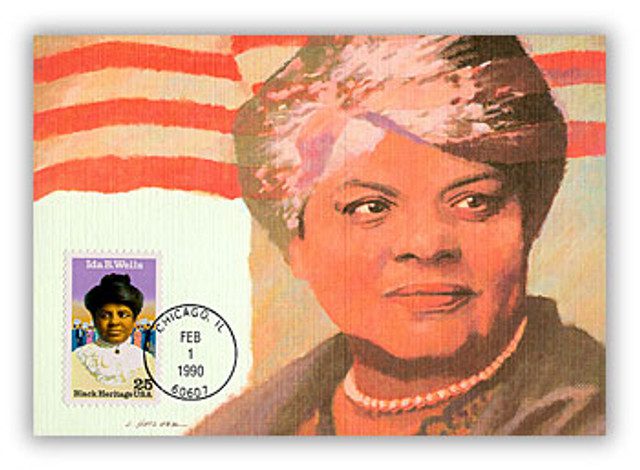On March 25, 1931, Civil Rights leader, journalist, and suffragette Ida B. Wells died at the age of 68.
Ida Bell Wells was born July 16, 1862, in Holly Springs, Mississippi, just before President Abraham Lincoln issued his Emancipation Proclamation. After the Civil War, Wells’ parents were freed and she attended the freedman’s school Shaw University. Then, at the age of 14, both her parents and her 10-month-old brother died of yellow fever. Rather than allow herself and her five siblings to be split up, Wells dropped out of high school and got a job as a teacher in an African-American school. Discovering that she was only making $30 a month while white teachers were paid $80, Wells grew increasingly interested in racial politics and improving African-American education.
In May 1884, while riding a train, Wells was ordered to give up her train seat to a white man and sit in the already packed “Jim Crow” car. When she refused, she was dragged from the car. Upon returning to Memphis, she hired an attorney and wrote a newspaper article about her experience. After the railroad company paid off her lawyer, she hired a white attorney who won the case and a $500 settlement. Then, in 1887, the Tennessee Supreme Court reversed the ruling and ordered Wells to pay the court costs.
Due to the attention she received from the case, Wells was invited to write weekly editorials for the Evening Star and The Living Way newspapers. Writing under the pen name “Iola,” she quickly gained significant attention for writing about race issues. In 1889, Wells became co-owner and editor of Free Speech and Headlight, an anti-segregationist newspaper.
In 1889, Wells’ friend Thomas Moss and two other black men were arrested and lynched while she was out of town. Shocked at their senseless deaths, she wrote an article urging the black Memphis community to leave the town, “which will neither protect our lives and property, nor give us a fair trial in the courts, but takes us out and murders us in cold blood when accused by white persons.” More than 6,000 people followed her suggestion and left town while others boycotted white-owned businesses. Wells began receiving threats on her life and started carrying a gun. This event also led Wells to research lynchings and what caused them. She found that the underlying reason was actually a resentment of the African-Americans’ economic success.
In 1893 and 1894, Wells traveled to Europe to bring international attention to the lynching issue in America. On her second trip, she was asked to write articles for the Daily Inter-Ocean, making her the first African-American woman to be a paid correspondent for a mainstream white paper. Wells’ trips led to the creation of anti-lynching groups in Europe that pressed the U.S. government to guarantee better treatment of its African-American citizens.
Wells continued writing and speaking out for African-American and women’s rights. She was one of only two women to sign “The Call” to form the NAACP and established one of the first black women’s suffrage groups. Wells dedicated the last 30 years of her life to urban reform in Chicago and raising her family. When she retired, Wells began work on her autobiography. But she died on March 25, 1931, before it was completed.
Discover what else happened on This Day in History.




i did not know Ida Wells story from an earlier generation. Thank you for it. She would be pleased with the progress we have made in civil rights, even though racial bigotry is still too pervasive in so many peoples’ thinking and actions.
only in your mind is it pervasive
You think it is :”only in your mind”? You think only Loren thinks that way?
He made the comment and ran away like most cowards. Not only was it pervasive in 2016, in 2019 we have a president that empowers people to bigotry. May I remind people that this is a stamp history comment page and to keep their unwanted dialogue in the sewer where it belongs. Thank you for your support.
I have read a lot of black history and never heard of Ida either. Thanks for this information, This daily page of history is wonderful. Thanks
So good to hear this part of African American history, and we should hear more about that history! African Americans have contributed a lot to his nation’s development, and thank you for high lighting the story of Ms. Ida Wells. In spite of progress made in the past in race relations, there is still more room for improvement.
A great historical example of ‘black (all) lives matter’; thanks to brave Ms Wells as she took on vested powers to improve our developing society. And no! this is not a ‘political’ rant (sorry if it comes across as such to some), just a ‘social’ comment on the way our culture has evolved; and thanks Mystic for bringing back to life, stamps that chronicled this progress over the years. May you rest in peace Ida Wells. GdR
Great historical information. Thanks.
What I found the most interesting from this little vignette was the part where “Europe pressed the United States to guarantee better treatment of… African-American citizens” as a result of Ms. Wells’ travel and writing. Quite a turn around from how the United States is usually viewed as a beacon of freedom, liberty, and civil rights among the countries of the world. Just goes to show how important it is to know, study, and learn from history.
Another great update for me in American history ! Thanks, again !